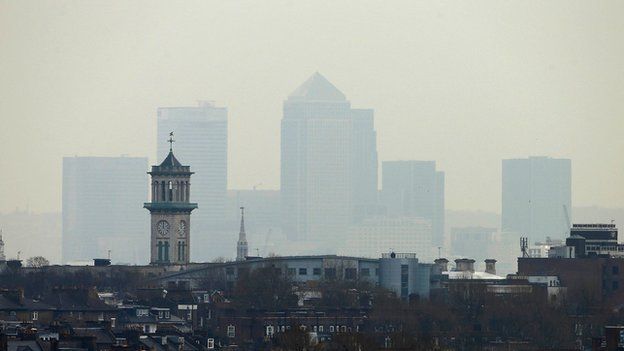UK admits that air quality targets will be missed by 20 years
- Published

The air quality in some of the UK's biggest cities is unlikely to meet EU standards before 2030, according to the government.
Member states were supposed to meet targets on pollutants from diesel cars and trucks by 2010.
The nitrogen dioxide (NO2) they produce is linked to a range of respiratory ailments.
But the European Court of Justice heard that London, Leeds and Birmingham could still be above these goals in 2030.
The court has been hearing evidence in a civil case brought by air quality activist group Client Earth. It has already been successful in the UK Supreme Court, winning a judgement that the government was breaching its legal duty on NO2.
The European case arose because the UK judges asked their European colleagues for a precise meaning of certain provisions of the EU air quality directive.
Confusion in court
Until today, the government had said that all parts of the UK would be in compliance by 2025.
There was some confusion when lawyers for the UK's Department for the Environment, Food and Rural Affairs (Defra) claimed that the 2030 plan was legally privileged information.
Lawyers for Client Earth pointed out that the new information had been posted on Defra's website the evening before.
"There were lots of red faces, confusion and embarrassment in Defra's corner," said Alan Andrews from the campaigners.
"I don't know whether it was cock up or conspiracy, but it put the UK in a very bad light."
A Defra spokesperson explained: "We published the projections in order to be open and transparent and we acknowledged the fact that they had been published at the hearing."
Client Earth argues that the latest scientific evidence shows NO2 to have similar effects to PM2.5, which the government says causes around 29,000 premature deaths in Britain each year.
The group says the UK's tax policies have encouraged the uptake of diesel cars, which are the principal source of the pollutant.
In 2000, just 14% of new cars sold in Britain were diesel powered. By 2010, it was almost half.
For the campaigners, the admission that London, West Yorkshire and the West Midlands will not comply with the EU standards until 2030 is very bad news indeed.
"They say they can't even achieve compliance by 2030. That's just so far in the future they're basically saying they are not going to comply," said Alan Andrews from Client Earth.
"All this really means is more delay and more death."
For its part, the government highlights the failure of the European Union's standards for diesel vehicles to improve the performance of these engines, a point accepted by campaigners.
The government also says it is spending significant amounts of money to clean the air.
"We are investing heavily in measures to improve air quality and have committed billions to increase uptake of ultra-low emission vehicles, sustainable travel and green transport initiatives," said a Defra spokesman.
"As our understanding of NO2 evolves, this must be reflected in our projections which is why we have revised these figures - work is underway to ensure compliance with EU limits in the shortest possible time."
Among the measures is £400m to support the early market for ultra-low emission vehicles up to 2015. The government says a further £500m has been secured to support this market up to 2020.
Whether these arguments will impress the court remains to be seen. A decision in the case is expected before the end of this year. This will then come back to the UK Supreme Court in 2015 for the final judgement.
If the UK loses, and is forced to rapidly comply, it could mean that the government would have to look again at tax policies that encourage motorists to use diesel.
It may also have implications for some of the UK's busiest streets.
"Take Oxford Street in London, which is 3.5 times above the legal limit. During peak episodes, it's 10 times the legal limit," said Alan Andrews.
"When it is that bad the only option is complete pedestrianisation. That's the only way they will achieve compliance on these really polluted streets."
Follow Matt on Twitter @mattmcgrathbbc
- Published20 February 2014
- Published22 January 2014